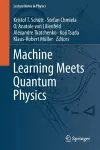
Machine Learning Meets Quantum Physics
6 contributors - Paperback
£74.99
Kristof T. Schütt studied computer science at the Technische Universität Berlin where he received the MSc. in 2012 and the Ph.D. degree in 2018.
During his doctoral studies in the machine learning group of TU Berlin and at the Berlin Big Data Center, his research interests has been representation learning of atomistic systems, in particular the development of interpretable neural networks for applications in quantum chemistry.Dr. Schütt has continued this research in a postdoctoral position at the Berlin Center for Machine Learning.
O. Anatole von Lilienfeld is Associate Professor of Physical Chemistry at the University of Basel. Research in his laboratory deals with the development of improved methods for first principles based sampling of chemical compound space using quantum mechanics, super computers, Big Data, and machine learning.
Previously, he was an associate professor at the Free University of Brussels. From 2013 to 2015 he was a Swiss National Science Foundation professor at the University of Basel. He worked for Argonne and Sandia National Laboratories, and from 2007 to 2010 he was a distinguished Harry S. Truman Fellow at Sandia National Laboratories, after postdoctoral work at New York University and at the University of California Los Angeles. In 2005, he was awarded a PhD in computational chemistry from EPF Lausanne. His diploma thesis work was done at ETH Zürich and the University of Cambridge. He studied chemistry at ETH Zürich, the Ecole de Chimie Polymers et Materiaux in Strasbourg, and the University of Leipzig.
He is editor in chief of the IOP journal "Machine Learning: Science and Technology", has been awarded the Feynman Prize in Nanotechnology, and is an ERC consolidator grantee.
Alexandre Tkatchenko is a Professor of Theoretical Chemical Physics at the University of Luxembourg and Visiting Professor at the Berlin Big Data Center. He obtained his bachelor degree in Computer Science and a Ph.D. in Physical Chemistry at the Universidad Autonoma Metropolitana in Mexico City.
Between 2008 and 2010, he was an Alexander von Humboldt Fellow at the Fritz Haber Institute of the Max Planck Society in Berlin.
Between 2011 and 2016, he led an independent research group at the same institute.
Tkatchenko has given more than 230 plenary/keynote/invited talks, seminars and colloquia worldwide, published more than 150 articles in peer-reviewed academic journals (h-index=57), and serves on the editorial boards of Physical Review Letters (APS) and Science Advances (AAAS).
He received a number of awards, including elected Fellow of the American Physical Society, the Gerhard Ertl Young Investigator Award of the German Physical Society, and two flagship grants from the European Research Council (ERC): a Starting Grant in 2011 and a Consolidator Grant in 2017.
His group pushes the boundaries of quantum mechanics, statistical mechanics, and machine learning to develop efficient methods to enable accurate modeling and obtain new insights into complex materials.
Koji Tsuda received B.E., M.E., and Ph.D degrees from Kyoto University, Japan, in 1994, 1995, and 1998, respectively. Subsequently, he joined former Electrotechnical Laboratory (ETL), Tsukuba, Japan, as Research Scientist. When ETL was reorganized as AIST in 2001, he joined newly established Computational Biology Research Center, Tokyo, Japan.
In 2000–2001, he worked at GMD FIRST (currently Fraunhofer FIRST) in Berlin, Germany, as Visiting Scientist.
In 2003–2004 and 2006–2008, he worked at Max Planck Institute for Biological Cybernetics, Tübingen, Germany, first as Research Scientist and later as Project Leader.
Currently, he is Professor at Department of Computational Biology and Medical Sciences, Graduate School of Frontier Sciences, the University of Tokyo. He is also affiliated with National Institute of Material Science (NIMS) and RIKEN Center for Advanced Intelligence Project.
His current research interests include machine learning, computational biology and materials informatics.
His current research interests include intelligent data analysis, machine learning, deep learning, and machine learning for the sciences (brain–computer interfaces, quantum chemistry, cancer).
Dr. Müller was a recipient of the 1999 Olympus Prize by the German Pattern Recognition Society, DAGM, and he received the SEL Alcatel Communication Award in 2006, the Science Prize of Berlin awarded by the Governing Mayor of Berlin in 2014, and the Vodafone Innovation Award in 2017.
In 2012, he was elected as a member of the German National Academy of Sciences Leopoldina, and in 2017, a member of the Berlin Brandenburg Academy of sciences, and an External Scientific Member of the Max Planck Society.
He has published numerous papers and holds several patents (GS > 67000, h-index = 112).